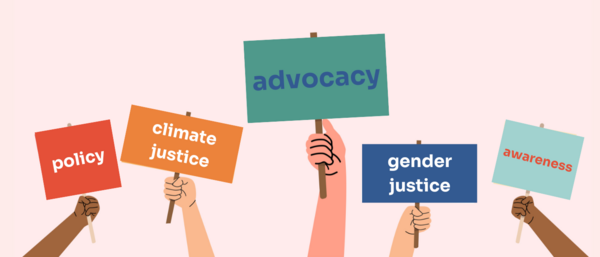Advocacy

Analysis of feminist approaches in development policy by Dr. Birte Rodenberg
Dr. Birte Rodenberg, esteemed board member of GenderCC, has recently penned a comprehensive analysis on the intersection of Germany's feminist foreign policy and the concurrent strategy on feminist development policy initiated by the German Ministry for Economic Cooperation and Development (BMZ). In her insightful examination, Dr. Rodenberg delves into the nuanced landscape of international development institutions, unraveling pivotal moments in the ongoing dialogue surrounding gender policy. She navigates the intricate interplay between these two significant policy frameworks, shedding light on the evolution of gender considerations in the realm of global development. This analysis serves as a valuable resource for those seeking a deeper understanding of the dynamic and interconnected initiatives shaping contemporary gender-inclusive policies on both national and international fronts.
Access the analysis here. The document is also available in German.
Joint oral statement by GenderCC and WECF with reference to Chapter 7 (International WHR) of the Alternative Report of the CEDAW Alliance Germany Including a statement on behalf of Feminists for a People's Vaccine Campaign (DAWN/ IWRAW AP/ TWN)
Gender CC and WECF (Women Engage for a Common Future) have published a joint oral statement with reference to Chapter 7 (International WHR) of the Alternative Report of the CEDAW Alliance Germany including a statement on behalf of Feminists for a People’s Vaccine Campaign (DAWN / IWRAW AP / TWN) to the 85th Session of the CEDAW Committee to consider the Ninth Periodic State Report by the Federal Republic of Germany on the Convention on the Elimination of all Forms of Discrimination against Women (CEDAW) and the Alternative Reports submitted by the respective NGOs.
We, Gender CC and WECF, as members of the German CEDAW Alliance, acknowledge the strategic advancement towards a transformative feminist approach framed by the feminist guidelines for Germany’s foreign and development policies.
However, we are deeply concerned about a severe lack of ambition and action, funding and policy coherence in core economic and ecological areas of its extraterritorial obligations:
- Firstly: The German Government must live up to its committed leadership responsibility within the Action Coalition on Economic Justice and Rights and promote Generation Equality within the Global Acceleration Plan.
- Secondly: Climate impacts are serious threats to women’s* and Black, Indigenous and People of Colour’s (BIPoC) human rights as protected under CEDAW. To be in line with the Paris Agreement, Germany must reduce emissions by 70% domestically. Yet, its current domestic policy, e.g. in the transport sector falls far behind. We therefore request the Committee to urge Germany to live up to national laws and international commitments and to provide the new feminist principles as a whole-of-government approach with the necessary resources in the budget and in climate finance.
- Thirdly, Germany’s economic interests, especially the extraction of fossil energy sources is at the expense of local communities and women*. We respectfully request the committee to urge the German Government to consistently pursue the phase-out of fossil energy and not to shift it to countries of the Global South, to ensure Germany’s environmental due diligence throughout all extraterritorial projects, as stipulated in the UN Guiding Principles on business and Human Rights, and to protect human rights of environmental journalists and human rights defenders, especially of Black, Indigenous and Women of Colour.
Finally, on behalf of Feminists for a People’s Vaccine Campaign, we want to stress that covid’s gendered impact is not over. Intellectual Property barriers preventing quitable access to COVID-19 vaccines, diagnostics and therapeutics are a key cause. We therefore urge Germany to support the promised extension of the 2022 TRIPS Decision to therapeutics and diagnostics to facilitate timely access, to withdraw its opposition at critical forums, like WTO and EU1, and be consistent with its Feminist Foreign Policy aspirations, principles and extraterritorial accountability.
"More than just technical solutions" - our statement on the CEDAW alternative report to the German government
Recently, the CEDAW Alliance Germany handed over its alternative report on the implementation status of the UN Convention on the Rights of Women in Germany to the German government. The report contains numerous recommendations and demands as to what measures need to be taken to ensure that the goal of gender equality is finally achieved. In addition, as a member of the CEDAW Alliance Germany, we have drafted a statement together with our partner organization WECF that gives more space to our core issues of climate and gender justice.
As the 6th IPCC report clearly states, women* and BIPoC (Black, Indigenous and People of Color) are the most vulnerable worldwide to the drastic impacts of global warming. This high level of vulnerability is due not only to ecosystem degradation, but also to socioeconomic inequalities and discrimination.
In our statement, we address diverse policy and economic issues related to the complex field of gender and climate justice.
- Policy Coherence: Feminist Foreign Policy and Feminist Development Policy Must Not Remain Isolated
- Non-European anti-territorial commitments, international cooperation, and equitable resource distribution.
- Gender justice in the climate finance architecture
- Energy poverty
- Domestic policy lags behind: transport and mobility
WECF and GenderCC are two international non-profit and non-governmental networks working for gender equality, women's rights, and climate justice. As active members of the Women's and Gender Constituency Group at the UNFCCC, we fight for the 1.5 degree target of the Paris Agreement and advocate for ensuring women's human rights as a prerequisite for effective action to mitigate climate change.
We and our allies deeply believe that the challenges of climate change and gender inequity are interconnected. A sustainable future requires changing gender power relations and societal structures.
This means more than technical solutions to reduce emissions. Instead, it requires real mitigation through awareness raising and comprehensive change of unsustainable lifestyles and current practices of unlimited economic growth.
The statement is also available in German.
